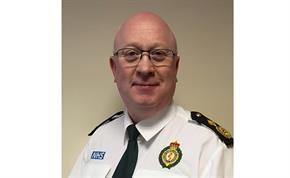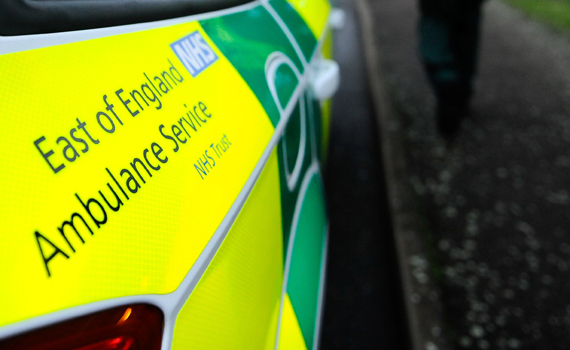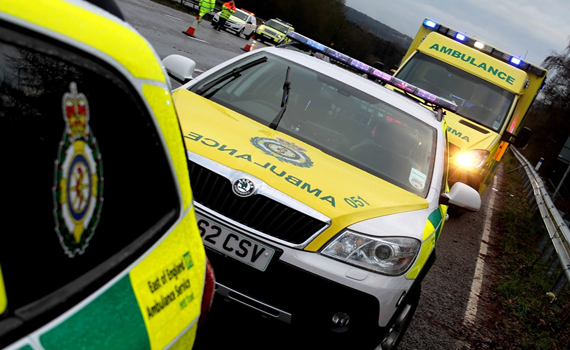
We are now starting to see the full impacts of winter pressure with hospital delays costing us around the equivalent of 30-40 shifts a day. The pressure is well and truly on with rising high acuity demand and urgent calls. All of our operational and clinical managers are supporting with Red 1 direct patient care at this time. We are focussing on delivering the best possible service to patients, protecting patient safety and staff health and wellbeing. Despite these pressures, we are still getting to more very sick patients more quickly than we have in recent times, so thank you for your personal contributions.
Last week, I stepped in front of the cameras and filmed some interviews with BBC Look East and ITV as well as some BBC radio in a bid to try to influence the public, so that they make the right decision before calling 999 and think about the right health care options for themselves. Despite this, we have seen demand rise, delays rise and we recognise the pressure that puts upon as all particularly at this time of year. Speaking to colleagues around the country, the same or even harder pressures are being felt too.
Over the weekend, we had a very high amount of calls, growing to more than 4,000 on Sunday (11th December). We’ve reviewed some of our surge actions and have introduced some no send guidance for some calls. We have also implemented the cohorting guidance which we shared with you last week. Thank you to everyone who has been tied up looking after patients in hospitals and in some cases for over five hours. We’re working and listening to find ways to make life easier for you, so you can get to the most seriously ill patients, have the backup you require promptly and get your meal breaks and reduce late finishes. This is all really hard to balance when we have a significant capacity gap, but despite these pressures on all of us, I have heard of some many cases of staff willing to show great flexibility and support to our patients and to support colleagues. That is very humbling and reflects on our profession as a whole the caring nature that is outstanding. We all are really mindful of our elderly fallers and I realise it must be hard to hear when a patient must wait for help. I went to a 99 year old lady myself last weekend who had been waiting a long time and was glad to be able to help her with some support in the community. It was a stark reminder of the impact we can have on both the patient and their relatives.

We do have a fundamental capacity gap and we are working with commissioners, stakeholders and regulators to continue to raise awareness and concern to get a closure of this gap. The entire executive team are spending significant time trying to achieve this. Due to the increased level of demand, we have seen a high use of overtime, agency and private ambulance service. But to be able to fund more this financial year, we’ve got to deliver on both our patient safety commitments and Red 1 responses for the money to be paid back. In other words we have to spend it at risk. This is not just an EEAST thing – the NHS is struggling as a whole with its finances.
Our emergency clinical advice and triage centre (ECAT) is up, running and growing fast. We have invested further by intercepting lower acuity calls over the phone and providing alternative pathways, so our patient facing staff can focus on high acuity and hot back up. Last weekend over 9% of calls were managed successfully by the team. We have started to re-triage some appropriate 111 calls with good success. This will enable us to give a better service to patients: for those who get clinical advice over the phone so get care faster and in the right place and for those patients who do need a physical response in the community. This will enable you to feel less pressure.
We have seen our surge level reach black status almost every day this last week. We also supported the wider health system with a major incident at Southend Hospital. My thanks to the teams involved in providing expert advice and support. I know there is a lot of pressure on our patient facing staff in EOC, ECAT and on the road, but need you to tell us early if you are experiencing delays at hospital, or indeed scenes, so we can start our escalation discussions early. Early clearing from scenes by RRVs for example, will greatly help the next acute patient. Every delay means there is a patient waiting, and nearly always there is someone waiting. Our surge levels are triggered as follows:
At each level, there is a list of actions the Gold commander takes on behalf of the Trust and this involves many people to ensure that we manage patient safety and staff welfare. We will let you know when these pressures are there so that you can have an awareness and therefore consider where and how you can help. With the recent increase in pressure, the executive team have added some extra transporting PAS up until the end of the year to try and release some of the pressure on long waits in the low acuity areas, such as falls and reduce the time colleagues are waiting for backups.
We have recently had a suggestion from patient facing staff about how we could make life easier for you in knowing what kit to take into a call or when trying to locate a colleague already on scene. This will see us putting the ISSI number for the radio in the back window of all of our solo fleet. More on this to follow.
I have been out to a number of patients recently from either home or the office and saved quite a few further responses. As well as creating the amusement for others by getting covered in mud, I have seen first-hand the great work, reassurance and care of our staff and just provided a helping hand as needed. I will be helping out over the festive period where I can too. This week I will be in both Suffolk and Norfolk and hope to say hello to those I can see.

You have all been doing a tremendous job with outstanding professionalism. As Robert said last week, we don’t say thank you enough. Commissioners and regulators have recently commented positively on the approaches we are taking to get to our seriously ill patients; the patients the ambulance service was founded for. So from me, thank you for your hard work and your care to all our patients. I have recently been on the receiving end of what the families of patients go through, after my daughter was involved in a road traffic collision. My personal thanks to the Cambridge crew who treated her – they were professional and reassuring to her and demonstrated the outstanding care you give to our patients every day.
This week, I attended St Edmundsbury Cathedral for an emergency services carol service and we welcomed the commissioning of eight new chaplains. Thank you to Paul, Amy, Nicola who did readings and prayers and to our Chair Sarah Boulton who addressed the welcome to the chaplains to the Trust. You can read the full story here.
Today I will be attending the funeral of Keith Marshall, a community first responder, co-ordinator and Trust user group member. I will be reading Keith’s eulogy and it will be an honour for me to speak about Keith’s many achievements and to thank and recognise his amazing work for the Trust.
I would like to take this opportunity to wish you all a happy Christmas. Christmas is a time for family, and I hope that all of you get the chance to spend some time with your loved ones over the festive period. I wish you and your families’ a very happy and peaceful Christmas. Once again, thank you. You are all stars.
Published 15th December, 2016